August 2017 | VOL. 16, NO. 8| www.McGowan.pitt.edu
Dr. Julie Phillippi Receives 5-year, $1.9 Million NIH R01 Award
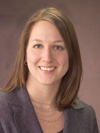
McGowan Institute for Regenerative Medicine affiliated faculty member Julie Phillippi, PhD, Assistant Professor in the Department of Cardiothoracic Surgery, University of Pittsburgh School of Medicine, received NIH funding for her project entitled “Matrix mediated vasa vasorum dysfunction in thoracic aortic disease.” The funding period is August 2017 through June 2022. The total award is $1,901,221.
Co-principal investigators on the project include McGowan Institute for Regenerative Medicine affiliated faculty members:
Thomas Gleason, MD, Ronald V. Pellegrini Endowed Professor and Chair of Cardiothoracic Surgery and Chief, Division of Cardiac Surgery, University of Pittsburgh School of Medicine
Marie Billaud, PhD, Research Assistant Professor in the Department of Cardiothoracic Surgery, University of Pittsburgh School of Medicine
Vera Donnenberg, PhD, Associate Professor of Cardiothoracic Surgery in the School of Medicine at the University of Pittsburgh
Stephen Badylak, DVM, PhD, MD, Professor in the Department of Surgery, a Deputy Director of the McGowan Institute for Regenerative Medicine, and Director of the Center for Pre-Clinical Tissue Engineering within the Institute
RESOURCES AT THE MCGOWAN INSTITUTE
September Histology Special
Make no Bones about it! The McGowan Histology Core has a Bone to pick FOR YOU!
The Histology lab offers decalcification, processing and embedding, cutting and staining of those difficult boney samples. Our staff has years of experience with bone samples that include special staining and IHC on sometimes difficult to work with, large and small bone samples. We have even developed a technique to insure your sample will not lift from the slide during aggressive antigen retrieval protocols.
Enjoy these beautiful examples, of just some of the special stains we offer at the McGowan Histology Core.
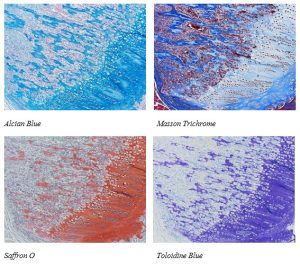
You’ll receive 25% off bone samples in September when you mention this ad.
Contact Lori at the McGowan Core Histology Lab and ask about our staining specials by email or call 412-624-5265. As always, you will receive the highest quality histology in the quickest turn-around time.
Did you know the more samples you submit to the histology lab the less you pay per sample? Contact Lori to find out how!
UPCOMING EVENTS
International Symposium on Regenerative Rehabilitation
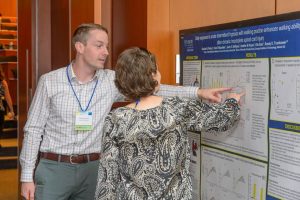
Medical advances in the field of Regenerative Medicine are accelerating at an unprecedented rate. Re-growing a lost limb, Restoring function to a diseased organ and harnessing the body’s natural ability to heal itself are becoming part of our reality. Technologies using biomaterials and cellular therapies to heal the body are in clinical trials and in clinical practice across the country. Regenerative Rehabilitation combines these discoveries with rehabilitation research in order to achieve synergy, propelling the translation into functionally relevant treatments and transforming the future of healthcare.
The Keynote Speaker is David J. Mooney, PhD of Harvard University. Dr. Mooney will speak on exploiting mechanics to promote regeneration.
The symposium will be held on November 1-3, 2017 at the University of Pittsburgh.
This symposium encourages participation of scientists, clinicians and physical therapists that are in the fields of regeneration and / or physical medicine and rehabilitation. This gathering is a platform for bridging these two areas of expertise in a setting that fosters discussion, interaction, cross discipline pollination intersection and networking.
Early-bird registration discount expires on Friday, September 15th. For more information and to register, please click here.
SCIENTIFIC ADVANCES
University of Pittsburgh’s Patent Record Broken 2 Years in a Row
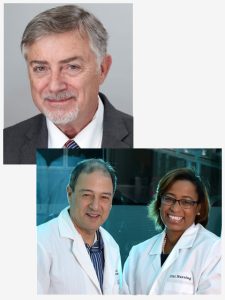
Pitt innovators have been issued a total of 92 U.S. patents through May, already surpassing the previous record of 80.
Patents are a crucial element in moving academic research to the marketplace, where it can make a difference in the world. Without the economic protection a patent provides, there is little incentive for companies to invest time and risk large amounts of money to further develop early stage discoveries into technologies, products, or life-saving treatments.
Several of the impactful discoveries that received patents this fiscal year are being commercially developed through licensing agreements and new startup companies, including two from McGowan Institute for Regenerative Medicine affiliated faculty members:
- Technology for genetically modifying the herpes simplex virus to target cancer cells and induce immune response, from the laboratory of Joseph Glorioso, PhD, Professor in the Department of Microbiology and Molecular Genetics at the University of Pittsburgh. The technology has been licensed by Massachusetts-based biotech startup Oncorus. The company raised $61 million last year to develop this cancer-fighting immunotherapy.
- Drug treatment that reverses excessive blood vessel growth and prevents excessive wound healing known as fibrosis, which are leading causes of vision loss in patients with eye diseases such as age-related macular degeneration. The therapy is based on a discovery developed by researchers Alan Wells, MD, DMS, Thomas J. Gill III Professor of Pathology and the Executive Vice-Chairman of the Department of Pathology at the University of Pittsburgh, and Cecelia Yates, PhD, Assistant Professor, Department of Health Promotion & Development, School of Nursing, University of Pittsburgh. Their research into the role of antifibrotic proteins in wound healing resulted in the development of peptide fragments that can be used to prevent vision loss. The innovation was licensed to startup Ocugenix, which recently received funding from Pitt’s Innovation Works to help advance to clinical trials that could begin as soon as 2018.
Pitt’s Center for Medical Innovation Awards Round-1 2017 Pilot Funding
 The University of Pittsburgh’s Center for Medical Innovation (CMI) awarded grants totaling $65,000 to three proposals through its 2017 Round-1 Pilot Funding Program for Early Stage Medical Technology Research and Development. Two of the three projects funded include McGowan Institute for Regenerative Medicine affiliated faculty members as part of their leadership teams. Award details include:
The University of Pittsburgh’s Center for Medical Innovation (CMI) awarded grants totaling $65,000 to three proposals through its 2017 Round-1 Pilot Funding Program for Early Stage Medical Technology Research and Development. Two of the three projects funded include McGowan Institute for Regenerative Medicine affiliated faculty members as part of their leadership teams. Award details include:
Objective Postpartum Uterine Tone Monitoring
Funds development of a new prototype uterine tone measurement device for eventual testing in the clinical setting. The device would evaluate intra-uterine muscle tone for detection of and control of postpartum bleeding.
Gerhardt Konig, MD
Department of Anesthesiology, University of Pittsburgh School of Medicine
Jason Shoemaker, PhD
Assistant Professor of Chemical & Petroleum Engineering, University of Pittsburgh Swanson School of Engineering
OrganEvac/Whole Organ Sonothrombolysis Device
This award is an equal participation between the Center for Medical Innovation and the Coulter Translational Research Partners II Program at Pitt. The early stage seed grant will demonstrate proof of concept that sonothrombolysis technology can greatly enhance viability of transplanted liver tissue through evaluation of thromboemboli in excised, non-transplantable human liver tissue.
Paulo Fontes, MD
Associate Professor of Surgery, University of Pittsburgh School of Medicine
Director of the Machine Perfusion Program, University of Pittsburgh Medical Center
John Pacella, MD, MS
Assistant Professor of Medicine, Division of Cardiology, University of Pittsburgh School of Medicine
University of Pittsburgh Medical Center Heart and Vascular Institute
Flordeliza Villaneuva, MD
Vice Chair for Pre-Clinical Research, Department of Medicine and Professor of Medicine, Division of Cardiology, University of Pittsburgh School of Medicine
Director, Center for Ultrasound Molecular Imaging and Therapeutics, University of Pittsburgh Medical Center
CMI, a University Center housed in Pitt’s Swanson School of Engineering, supports applied technology projects in the early stages of development with “kickstart” funding toward the goal of transitioning the research to clinical adoption. Proposals are evaluated on the basis of scientific merit, technical and clinical relevance, potential health care impact and significance, experience of the investigators, and potential in obtaining further financial investment to translate the particular solution to healthcare.
“This is our sixth year of pilot funding,” said Alan Hirschman, PhD, CMI Executive Director and McGowan Institute for Regenerative Medicine affiliated faculty member. “Since our inception, more than $1 million from external funding sources and from the Swanson School of Engineering has been invested in early stage medical technologies. Many of these technologies have the potential to significantly improve the delivery of health care and several new companies have resulted from the program, which has successfully partnered UPMC’s clinicians and surgeons with the Swanson School’s engineering faculty.”
Illustration: Center for Medical Innovation.
Sending the Right Signals
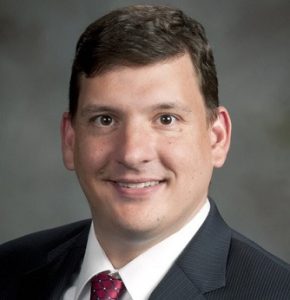
Through a process called cell signaling, cells collaborate on necessary functions such as responding to changes in the environment, fighting off threats to the body, or regulating the basic processes that keep the body alive. Cells work much like computers carrying out functions and use cell signaling over a vast network. Also, much like computers, cells can be reprogrammed to change their behavior.
McGowan Institute for Regenerative Medicine affiliated faculty member Warren Ruder, PhD, assistant professor in the Department of Bioengineering at the University of Pittsburgh Swanson School of Engineering, is developing microparticles that carry engineered bacteria known as ‘smart biomaterials.’ As the basis of a study recently supported by the National Science Foundation, Dr. Ruder will use the biomaterials to reprogram mammalian cell signaling. The goal of the study is to use these hybrid, living-nonliving biomaterials to better understand how cell signaling works and influence cell behavior when a problem occurs.
“Fundamentally, many diseases result from incorrect cell signaling,” explains Dr. Ruder, “which causes the body’s natural control systems to fail to maintain normal function, or homeostasis. New tools that allow cell signaling to be rewired therefore can affect many diseases. This project is geared toward developing new tools for exploring and rewiring cell signaling.”
Dr. Ruder will serve as principal investigator of the project titled “Creating Smart Biomaterials Using Engineered Bacteria that Cooperatively Reprogram Mammalian Cells.” The research will focus on delivering synthetic genetic components to mammalian cells and reprogramming their calcium signaling processes, specifically. Calcium signaling occurs in many cells, and it controls both slow and fast cellular processes.
“Calcium signaling is one of the most important cell signals,” Dr. Ruder says. “It is the signature of muscle contraction, relevant to many forms of cardiac or musculoskeletal disease, but also a master regulator of processes ranging from neuron firing and brain function to fertilization.”
Once Dr. Ruder introduces the smart biomaterials, they will be able to collaborate and collectively determine when to transmit genetic components to mammalian cells. Dr. Ruder will then use mathematical modeling and computation simulation to explore the processes behind calcium signaling in mammalian cells and which genetic alterations will cause the most significant changes in cell signaling dynamics.
“The bacteria will be genetically engineered to invade mammalian cells. Once inside, they will genetically engineer the mammalian cells in a process distinctly different from viral genetic delivery. We will engineer two different types of bacteria that will signal each other and thus work as a team to invade after they monitor the environment,” says Dr. Ruder.
Drs. Prashant Kumta and Robert Kormos and CardioSense Receive Funding from Coulter@Pitt TPII Program
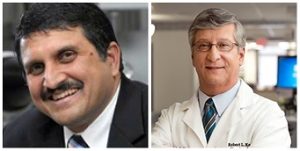
The McGowan Institute for Regenerative Medicine congratulates McGowan Institute for Regenerative Medicine affiliated faculty members …
- Prashant Kumta, PhD, Edward R. Weidlein Chair Professor at the University of Pittsburgh Swanson School of Engineering and School of Dental Medicine, Engineering Director of the Center for Craniofacial Regeneration, and the Founding Director of the Center for Complex Engineered Multfunctional Materials, both at the University of Pittsburgh, and
- Robert Kormos, MD, Professor of Cardiothoracic Surgery and Bioengineering at the University of Pittsburgh, director of UPMC’s Artificial Heart Program, and co-director of the Heart Transplantation Program,
… on their award of $50,000 from the Coulter@Pitt TPII Program for a full year starting July 1, 2017 and ending June 30, 2018.
CardioSense is a rapid and simple point-of-care technique for detecting and monitoring cardiovascular disease. This hand-held device reads a drop of blood and then determines within 5 minutes the levels of cardiac markers, i.e. Troponin, in the bloodstream. The results are then transmitted wirelessly to a healthcare provider for further action. Learn more here.
Drs. Kumta and Kormos demonstrated to the program’s Oversight Committee (OC) that CardioSense satisfies a large unmet clinical need and that, in the OC’s judgement, there is likely a viable path to commercialization.
The Coulter Program’s mission is to help translate promising technologies to clinical practice through commercial products, with the goal of improving healthcare and patient outcomes. To do so requires tremendous effort on the part of the innovators and subsequent business teams to address the challenges of product development, clinical trials, regulatory approvals, raising capital, and a myriad of marketing and economic issues.
Lecture: Dr. Marc Simon, Lead Investigator, Phase 2 Study in Patients with Pulmonary Hypertension
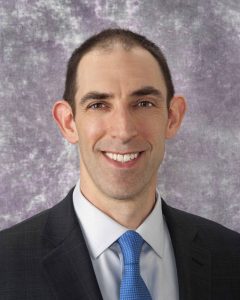
McGowan Institute for Regenerative Medicine affiliated faculty member Marc Simon, MD, MS, FACC, Associate Professor of Medicine, Bioengineering, and Clinical Translational Science, and Director, Heart Failure Research / Clinical Hemodynamics Core Facility, at the Pittsburgh Heart, Lung, and Blood Vascular Medicine Institute at the University of Pittsburgh, is the lead investigator on a 50-patient, open-label Phase 2 study in patients with pulmonary hypertension (PH) from multiple different etiologies. Dr. Simon recently presented the study’s results in an invited lecture at the 4th Annual Drug Discovery and Development Symposium for Pulmonary Hypertension. The study’s product, Aironite, is in development by Savara, Inc., a clinical-stage specialty pharmaceutical company focused on the development and commercialization of novel therapies for the treatment of serious or life-threatening rare respiratory diseases.
In the 41 patients enrolled to date in the study, administration of Aironite significantly improved multiple hemodynamic measures, with most pronounced improvements in patients with pulmonary hypertension due to heart failure with preserved ejection fraction (PH-HFpEF). In the 10 PH-HFpEF patients analyzed, Aironite administration resulted in significant overall decreases in right atrial pressure, systolic and diastolic right ventricular pressure, systolic and diastolic pulmonary artery pressure, and pulmonary capillary wedge pressure. Of note, pulmonary capillary wedge pressure decreased by 7.5 mmHg (95% CI –9.0 to –6.0; baseline median value 18mmHg; p < 0.05) and mean pulmonary artery pressure decreased by 7.9 mmHg (95% CI –9.4 to –6.3; baseline median value 34 mmHg; p < 0.05). Pulmonary artery compliance (Cpa) was improved by 35% (+0.97 ml/mmHg, 95% CI +0.25 to +1.68; p < 0.01). Aironite was generally well-tolerated and no significant safety concerns were identified, supporting the primary safety outcome of the study.
“These additional results build upon prior interim data published last year in the Journal of Clinical Investigation, and demonstrate that Aironite can significantly improve cardiopulmonary hemodynamics in HFpEF as well as Group 3 PH patients, both clinical conditions which are inadequately treated by currently approved medicinal treatments,” stated Taneli Jouhikainen, MD, PhD, Chief Operating Officer of Savara. “If the observed short-term improvements are translated into clinically meaningful functional improvements in our ongoing placebo-controlled studies in HFpEF patients, we believe the product will have exciting potential to be advanced towards Phase 3 studies and hopefully an eventual NDA filing.”
Welcome New CATER Trainees and Faculty!
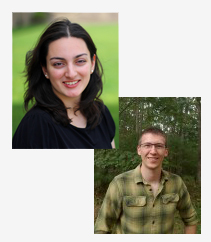
Please welcome Laura Molina (MSTP) and Michael Behrens (BioE) to the Cellular Approaches to Tissue Engineering and Regeneration (CATER) training program sponsored by NIH/NIBIB.
Laura Molina is a MD/PhD candidate in the Medical Scientist Training Program (MSTP) and part of Dr. Monga’s lab. Her research project is focused on Liver Growth and Development. Laura comes to the University from University of Florida where she earned a Bachelor’s of Science degree in Biochemistry and Molecular Biology. She also spent 4 months in 2014 as an NSF-UF-US/France Research Experience for undergraduates. Welcome Laura!
Michael Behrens is a PhD candidate in the department of Bioengineering. Michael moved to Pittsburgh when his mentor Dr. Warren Ruder decided to relocate here. Michael’s research project is focused on Synthetic Biology. Michael received a Bachelor’s of Science in Engineering from Walla Walla University in College Place, Washington with a focus on Electrical Engineering. Michael will bring a unique prospective to our group. Welcome Michael!
In addition to the two new trainees, we also have a new faculty member, Dr. Warren Ruder. Dr. Ruder is an Assistant Professor, Engineering Living Systems Lab, Department of Bioengineering. Dr Ruder moved his research group to the University of Pittsburgh’s bioengineering department in January 2017. Previously, he spent four years as an assistant professor in Virginia Tech’s Biological Systems Engineering Department, where he led the Engineering Living Systems Lab. His expertise is in synthetic biology, cellular and molecular biomechanics and lab-on-a-chip systems. Dr. Ruder received his PhD in Biomedical Engineering and his MS in Mechanical Engineering from CMU. He also has a BS in Civil Engineering from MIT. From 2003-2005, he was a Health Science Specialist at the VA Boston Healthcare System and Harvard Medical School. From 2005-2009, Dr. Ruder was an inaugural NIH trainee in the Pitt-CMU Biomechanics in Regenerative Medicine (BiRM) Training Program. From 2010-2012, he was a post-doctoral research associate in the group of Jim Collins at Boston University (now at MIT) and Harvard University’s Wyss Institute for Biologically Inspired Engineering.
AWARDS AND RECOGNITION
Celebrating the Career of Professor Savio L-Y. Woo
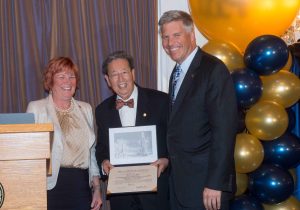
Amongst the University leadership who came to celebrate Dr. Woo’s accomplishments were Chancellor Patrick Gallagher, Chancellor Emeritus Mark Nordenberg, Provost Patricia Beeson, Provost Emeritus James Maher, Dean of the Swanson School of Engineering Gerald Holder, Chair of Bioengineering Sanjeev Shroff, and Distinguished Professor and former Chair of the Department of Bioengineering Harvey Borovetz.
Provost Patricia Beeson presented Dr. Woo with a certificate recognizing his appointment as a Distinguished University Professor Emeritus. The designation of Distinguished University Professor is the highest honor that can be accorded to a member of the faculty. (Photo: Provost Beeson, Dr. Woo, and Chancellor Gallagher.)
Congratulations Dr. Woo, thank you for your substantial and sustained contributions, and best wishes for continued success!
Photo Credit: Mike Drazdzinski-University of Pittsburgh
Rocky Tuan, PhD, Appointed the Eighth Vice-Chancellor and President of The Chinese University of Hong Kong
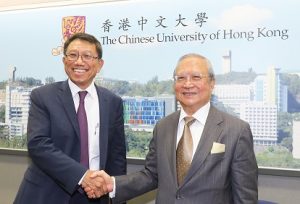
Recently, the Council of The Chinese University of Hong Kong (CUHK) unanimously approved the appointment of McGowan Institute for Regenerative Medicine Associate Director Rocky Tuan, PhD, as the eighth Vice-Chancellor and President of CUHK for a period of 6 years from 1 January 2018.
Born in Hong Kong, Dr. Tuan is a world leading biomedical scientist specializing in stem cell science and regenerative medicine. He is currently the Distinguished Professor and Executive Vice-Chairman in the Department of Orthopaedic Surgery, Arthur J. Rooney, Sr. Chair in Sports Medicine, Director of the Center for Cellular and Molecular Engineering, Founding Director of the Center for Military Medicine Research, and Professor in the Department of Bioengineering, at the University of Pittsburgh.
Dr. Tuan is well acquainted with higher education in Hong Kong. He previously served as a member, then Chairman, of the Biology and Medicine Panel of the Hong Kong Research Grants Council. Since 2016, Dr. Tuan has been serving as Distinguished Visiting Professor and Director of the Institute for Tissue Engineering and Regenerative Medicine at CUHK.
The Council Chairman, Dr. Norman Leung said, “The Council is very delighted to have Professor Tuan at the helm of the University to take it into new realms of achievement. As a comprehensive research University, CUHK needs a visionary leader of distinguished academic standing and with a profound understanding of local and global higher education and research systems to be the Vice-Chancellor and President. Professor Rocky Tuan is a perfect match. We are confident that Professor Tuan will take CUHK to levels of distinction even more remarkable than those of its past.”
Foster Education and Research Excellence at the University
Dr. Tuan remarked, “It is indeed my honor to be appointed the Vice-Chancellor and President of CUHK, a university I hold in the highest esteem. CUHK is an internationally renowned comprehensive research university with a long history of general education, which places integrated emphasis on formal learning experience and whole-person education. I look forward to working with the University community to nurture and cultivate these unique characteristics of CUHK, while at the same time, fostering its teaching and research excellence.” He added, “My primary goal is to lead CUHK in a way that gives further strength to its education and its excellence in research and engagement. I will do my utmost to achieve this.”
World-renowned Biomedical Scientist
Dr. Tuan’s longstanding research activities in musculoskeletal biology and tissue regeneration, carried out in academia as well as at the U.S. National Institutes of Health, cover basic science and engineering, as well as translational and clinical applications. Widely known for his expertise in skeletal tissue engineering and regeneration, Dr. Tuan’s research has made significant contributions to the understanding of and potential solutions to pressing clinical needs.
At present, Dr. Tuan directs a multidisciplinary research program, which focuses on orthopaedic research as a study of the biological activities that are important for the development, growth, function, and health of musculoskeletal tissues, and the utilization of this knowledge to develop technologies that will regenerate and/or restore function to diseased and damaged skeletal tissues. Ongoing research projects are directed towards multiple aspects of skeletal and related biology, including skeletal development, stem cells, growth factor signaling, bone-biomaterial interaction, cell-extracellular matrix interaction, nanotechnology, biomaterials, 3D printing, mechanobiology, regenerative medicine, tissue engineering, and microphysiological tissue chips. His research team utilizes an integrated experimental approach that combines contemporary technologies of biochemistry, cell and molecular biology, embryology and development, cellular imaging, and bioengineering.
Congratulations, Dr. Tuan!
Illustration: Dr. Rocky Tuan, Vice-Chancellor and President Designate (left) and Dr. Norman Leung, Chairman of the University Council, CUHK.
2017 topDentists

Pittsburgh Magazine has published the list of top dentists in the region as prepared through a peer review process McGowan Institute for Regenerative Medicine affiliated faculty members honored in 2017 include:
Oral and Maxillofacial Surgery
- William Chung, MD, DDS, Professor in the Department of Oral and Maxillofacial Surgery, School of Dental Medicine, University of Pittsburgh
- Bernard Costello, MD, DMD, FACS, Professor, the Chief/Division of Craniofacial and Cleft Surgery, and the Fellowship Program Director, in the Department of Oral and Maxillofacial Surgery
Periodontics
- Charles Sfeir, DDS, PhD, Associate Dean of Research in the University of Pittsburgh School of Dental Medicine, an Associate Professor in the Clinical and Translational Science Institute, an Associate Professor in the School of Dental Medicine (Departments of Oral Biology and the Department of Periodontology) and the School of Engineering (Biomedical Engineering), and the Founding Director of the Center for Craniofacial Regeneration
The list is excerpted from the 2017 edition of topDENTISTS, a database which includes listings for more than 360 dentists and specialists in the Greater Pittsburgh metropolitan area. The Pittsburgh list is based on thousands of detailed evaluations of dentists and professionals by their peers. Dentists and specialists are asked to take into consideration years of experience, continuing education, manner with patients, use of new techniques and technologies, and of course, physical results.
The nomination pool of dentists consists of dentists listed online with the American Dental Association as well as all dentists listed online with their local dental societies, thus allowing virtually every dentist the opportunity to participate. Dentists are also given the opportunity to nominate other dentists that they feel should be included in the list. A dentist’s inclusion on the list is based on the subjective judgments of his or her fellow dentists.
2017 Wiegand Intern Completes Assignment
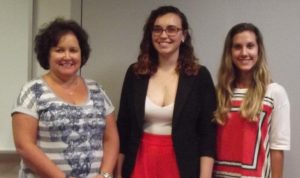
The Wiegand Summer Internship provides an opportunity for a high school senior, who resides in Allegheny County and who graduated in the spring of 2017, to spend 5 weeks learning first-hand about regenerative medicine research and scientific investigations in general.
The 2017 Wiegand Intern was Kira Furlong, a graduate of Keystone Oaks High School. Kira is now attending the University of Pittsburgh, where she is studying neuroscience and music. Her internship was in the Plastic Surgery Laboratory under the mentorship of McGowan Institute for Regenerative Medicine faculty member Kacey Marra, PhD, associate professor, Department of Surgery, University of Pittsburgh, director of the Plastic Surgery Laboratory, and co-director of the Adipose Stem Cell Center. Kira worked on a project concerning peripheral nerve injuries in the wrist. The purpose of the project was to help regain pinching motion in human nerve injuries.
The Wiegand Summer Internship is made possible through an endowment from Mr. and Mrs. Bruce Wiegand, friends and supporters of the McGowan Institute for Regenerative Medicine. The endowment is designed to provide an opportunity for a high school senior to experience the opportunities and excitement of a career in science and engineering, with a focus on regenerative medicine.
Illustration: Pictured are (L to R): Dr. Marra, Kira Furlong, and Gabriella DiBernardo.
Regenerative Medicine Podcast Update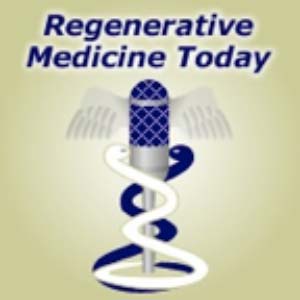
The Regenerative Medicine Podcasts remain a popular web destination. Informative and entertaining, these are the most recent interviews:
#174 –– Dr. Alexander Spiess is the Division Chief of Hand in the Department of Plastic Surgery and the Program Director of the Plastic Surgery component of the Plastic Surgery Hand and Upper Extremity Fellowship at UPMC. Dr. Spiess discusses his work in fingertip regeneration.
Visit www.regenerativemedicinetoday.com to keep abreast of the new interviews.
PICTURE OF THE MONTH
We encourage submissions of images that highlight your research. If you have images, or have an idea for an interesting image, please contact Donna Stolz, PhD at donna.stolz@pitt.edu.
PUBLICATION OF THE MONTH
Author: Huleihel L, Bartolacci JG, Dziki JL, Vorobyov T, Arnold B, Scarritt ME, Pineda Molina C, LoPresti ST, Brown BN, Naranjo JD, Badylak SF
Title: Matrix-Bound Nanovesicles Recapitulate Extracellular Matrix Effects on Macrophage Phenotype
Summary: The early macrophage response to biomaterials has been shown to be a critical and predictive determinant of downstream outcomes. When properly prepared, bioscaffolds composed of mammalian extracellular matrix (ECM) have been shown to promote a transition in macrophage behavior from a proinflammatory to a regulatory/anti-inflammatory phenotype, which in turn has been associated with constructive and functional tissue repair.
The mechanism by which ECM bioscaffolds promote this phenotypic transition, however, is poorly understood. The present study shows that matrix-bound nanovesicles (MBV), a component of ECM bioscaffolds, are capable of recapitulating the macrophage activation effects of the ECM bioscaffold from which they are derived.
MBV isolated from two different source tissues, porcine urinary bladder and small intestinal submucosa, were found to be enriched in miRNA125b-5p, 143-3p, and 145-5p. Inhibition of these miRNAs within macrophages was associated with a gene and protein expression profile more consistent with a proinflammatory rather than an anti-inflammatory/regulatory phenotype.
MBV and their associated miRNA cargo appear to play a significant role in mediating the effects of ECM bioscaffolds on macrophage phenotype.
Source: Tissue Eng Part A. 2017 Jun 30. [Epub ahead of print]
GRANT OF THE MONTH
PI: Julie Phillippi
Co-PI: Thomas Gleason, Marie Billaud, Vera Donnenberg, Stephen Badylak
Title: Matrix mediated vasa vasorum dysfunction in thoracic aortic disease
Description: Microvascular remodeling is an important contributor to vascular disease. Our team is broadly interested in how the extracellular matrix (ECM) affects microvascular function, and we are poised to make important contributions in this area to improve mechanistic understanding of human ascending aortic disease.
The long-term goal of our work is to develop better strategies to diagnose and treat the over 2.5 million people affected worldwide by dissection and/or rupture of thoracic aortic aneurysm (TAA).
We demonstrated that deficiency in angiogenic factors and collagen immaturity in the adventitial ECM are associated with vasa vasorum remodeling in degenerative and bicuspid aortic valve-associated TAA.
These noted adventitial ECM disruptions in TAA helped to shape our central hypothesis that matrix cues in TAA provoke vasa vasorum dysfunction. Preliminary studies by our team revealed that hydrogel bioscaffolds made from adventitial ECM recapitulate native microstructure and retain signaling cues that invoke angiogenesis in vivo and endothelial cell proliferation and formation of branched networks in vitro.
We will use human aortic tissue from early stages and multiple etiologies of TAA and porcine arteries to prepare ECM bioscaffolds from these tissues as biomimetic matrices of healthy and disease microenvironments.
This approach optimally tests our central hypothesis at the whole vessel and cellular levels through execution of two specific aims. Aim 1) Determine how extracellular matrix of TAA affects remodeling and endothelial function of vasa vasorum; and Aim 2) Identify what matrix signals are necessary for regeneration of functional vasa vasorum.
Under the first aim, we will comprehensively characterize the adventitial matrix of healthy aorta and various stages of human aneurysmal disease. We will then use ECM bioscaffolds derived from these human tissues to determine how matrix cues impact remodeling and endothelial function in isolated whole vessels of vasa vasorum and primary cultured human endothelial cells. Under the second aim, we will identify what growth factor-dependent and independent matrix cues regenerate functional vasa vasorum by pericytes isolated from TAA using in vitro and in vivo techniques.
What we learn about vasa vasorum function in TAA could lead to the development of novel diagnostic approach that measure in vivo microvascular function in patients. Because aortic replacement remains the only treatment for ascending TAA, our work addresses an unmet clinical need to develop better therapies for TAA.
Ultimately, the proposed research aspires to yield translational methods to understand, diagnose, and treat TAA, and therefore, improve patient-specific risk mitigation for aortic catastrophe. These approaches are innovative because they focus on aortic disease from perspective of the adventitial matrix which could lead to development of novel medicinal and regenerative medicine therapies and could help develop improved diagnostic measures for TAA.
Source: National Heart, Lung, and Blood Institute
Term: August 2017 – June 2022
Amount: $1,901,221
